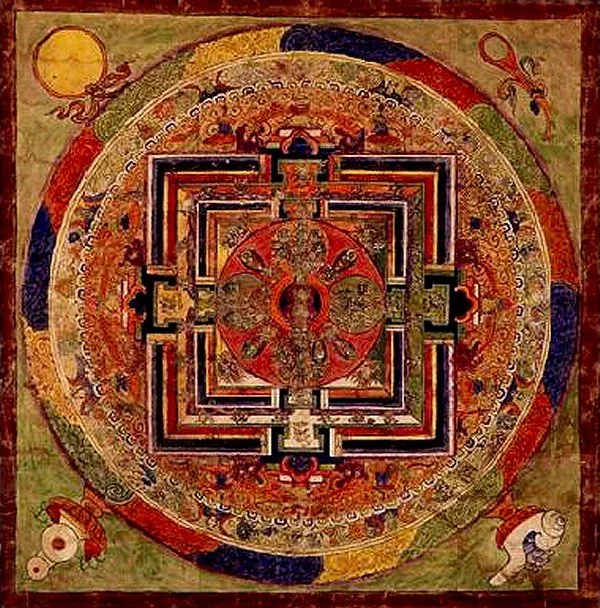Stuck In The Bardo Again
Religion Unplugged believes in a diversity of well-reasoned and well-researched opinions. This piece reflects the views of the author and does not necessarily represent those of Religion Unplugged, its staff and contributors.
Zhi-Khro mandala, a part of the Bardo Thodol's collection, a text known in the West as “The Tibetan Book of the Dead,” which comprises part of a group of bardo teachings held in the Nyingma (Tibetan tradition) originated with guru Padmasambhava in the 8th century. Creative Commons photo.
(OPINION) Remember this refrain by the otherwise forgotten 1970s folk rock group Stealers Wheel?
Clowns to the left of me
Jokers to the rightHere I am
Stuck in the middle with you
That is how I currently feel, thanks to the contentious upcoming American election and the various warnings that COVID-19 infections, and deaths, are likely to again spike this winter.
I could add the worsening global economic picture and the prospect that Russia’s brutal invasion of Ukraine could turn Europe into a nuclear testing ground. Then, of course, there’s the uncertainty of climate change.
And I don’t think I’m alone. Actually, I’m hard pressed to believe that most individuals paying attention to the daily avalanche of disconcerting news are not similarly stuck.
Buddhism has a term for this state. It’s called the “bardo,” and it’s being referenced repeatedly in Buddhist conversations these days.
Pema Khando Rimpoche, a California-based Vajrayana (Tibetan) Buddhist teacher explained it this way in the magazine Lion’s Roar:
The Tibetan term bardo, or “intermediate state,” is not just a reference to the afterlife. It also refers more generally to these moments when gaps appear, interrupting the continuity that we otherwise project onto our lives. In American culture, we sometimes refer to this as having the rug pulled out from under us, or feeling ungrounded.
These interruptions in our normal sense of certainty are what is being referred to by the term bardo. But to be precise, bardo refers to that state in which we have lost our old reality and it is no longer available to us.
The lesson here is to become comfortable with change, and even welcome it — a bit of dogma that anyone who has tried it quickly learns is far more easily articulated than actually manifested.
From a Buddhist perspective, change is life’s sole constant. Resisting it is not only futile but invariably leads to avoidable mental anguish, or “dukkha,” as it’s referred to by Buddhists.
Of course, not just Buddhists sense that life-altering changes are afoot. Their descriptive religious language may be different, but others also sense that our reworked lives are becoming markedly different, even if they can’t as yet say how.
One survey of self-identified religious Americans of all faiths found that almost two-thirds of those polled considered the pandemic a godly message of the need for personal and societal change.
The survey — jointly conducted by the University of Chicago Divinity School and The Associated Press-NORC Center for Public Affairs Research — found that 31% of Americans who said they believe in God felt “strongly” that the virus was a sign that humanity needs to change its habits. An equal percentage said they “somewhat” agreed.
Evangelical Protestants were more likely than others to believe that strongly, at 43%, compared with 28% of Catholics and mainline Protestants.
The question was asked of all Americans who said they believe in God. However, results for minority faiths, such as Jews and Muslims, were not broken out.
Those surveyed were not asked to define their understanding of “God,” nor were they asked just what sort of change they foresaw.
If asked, we would all answer these last two questions differently. But that’s beside the point.
What’s key is that we’re all looking to make sense of our largely unprecedented circumstances, even if the meanings we deduce turn out to be radically different, and even in opposition.
For example, my vision of needed change includes acting with greater compassion, justice and self-awareness. It imagines a world that’s less enamored with frivolity; is less wasteful, less aggressive and less materialistic.
It’s one in which we learn to live in greater symbiosis with the world’s varied creatures, human and otherwise.
But here’s the thing about bardo consciousness. Change probably won’t unfold as you’d want — certainly not all of it, anyway.
Pulitzer Prize winning writer, historian and anthropologist Jared Diamond — in his 2005 book “Collapse: How Societies Choose to Fail or Succeed” — noted the tendency of people to fall back into behavioral patterns that once sustained them but are ill-suited and even self-defeating in dramatically changed circumstances.
The rush to restore “normalcy” — from the White House down to those desperate for a restaurant meal with family and friends — despite the many uncertainties about how the coronavirus will play out, seems to validate Diamond’s words.
The popular blogger Heather Cox Richardson, a political historian by occupation, wrote, “This sort of chaos and confusion destabilizes society. In that confusion, as tempers run hot, people who are desperate for certainty return to old patterns and divide along traditional lines.”
If the bardo were a rock song, it might be summed up by this refrain by another rock group, one that’s managed to hold up a lot better than Stealers Wheel:
You can't always get what you want
But if you try sometimes, well, you just might find
You get what you need
Ira Rifkin is an author and veteran religion journalist. He lives in Annapolis, Maryland.

